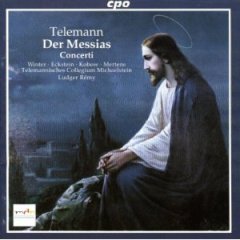Telemann – Der Messias – Concerti (Remy) [2003]
Telemann – Der Messias – Concerti (Remy) [2003]

1. Der Messias. Part 1 TWV 6:4a. Sing, unsterbliche Seele (Tenor) (1:14)
2. Vergegens erhuub sich Satan (Bass) (1:20)
3. Prachtig (Instrumental) (1:15)
4. Aber, o Werk, das nur Golt allgegenwarting (Alto) (1:39)
5. Sterbliche, kennt ihr die Ehre (Soprano, Tenor) (4:35) play
6. Gott kam selber vom Himmel herab (Bass, Alto) (3:06)
7. Part 2 TWV 6:4b. Vorspiel (3:30)
8. Mirjams, und deine Wehmut, Deborah (Tenor) (0:55)
9. Schonster unter den Menschen ( Soprano, Alto) (7:10)
10. Symphonie (1:48)
11. Mirjam, sein Auge verlischt (Alto, Soprano) (6:22)
12. Partie TWV 44:42 in A minor: I. without tempo (1:02)
13. II. without tempo (1:57)
14. III. Affetuoso (1:35)
15. IV. Vivace (2:13)
16. Sonata TWV 44:11 in F major: I. Affettuoso (2:42) play
17. II. Allegro (2:09)
18. III. Adagio (2:02)
19. IV. Presto (1:47)
20. Concerto TWV 43:Es 1 in E flat major: I. Grave (2:02)
21. II. Allegro (2:09)
22. III. Andante (1:47)
23. IV. Allegro (3:08)
Jan Kobow - tenor Veronika Winter - soprano Marion Eckstein - alto Klaus Mertens - bass Telemannisches Collegium Michaelstein
Ludger Remy - conductor
Georg Philipp Telemann (1681-1767) has suffered from comparison with his four-years-younger contemporaries, J. S. Bach and George Frederick Handel. This, plus his enormous catalog of works, has made it difficult to get a fix on him as a major composer. But major he was, and he is finally, in these days of CD riches, getting many recordings.
This one gives us works from the two ends of his very long career. There are three early instrumental works--each a kind of sonata da chiesa, each filled with contrapuntal mastery, each with tunes galore--and a major vocal-instrumental work, the setting of words from Klopstock's 'Messias' ('The Messiah'). The instrumentalists are members of the Telemann Collegium Michaelstein, directed by Ludger Rémy. In the 'Messias' the soloists are Veronika Winter, soprano, Marion Eckstein, alto, Jan Kobow, tenor, and Klaus Mertens, bass.
The three sonatas (actually entitled, 'Partie,' 'Sonata,' and 'Concerto' respectively--roughly interchangeable terms in those days, the first decade of the 1700s) are each about 8 minutes long, in four movements, and comprising 7, 5, and 4 parts (counting the basso continuo as one part) respectively. They are far more contrapuntal than the much later 'Messias.' The seven-voice 'Partie' [TWV 44:42 in A minor] is particularly attractive using, as it does, 2 recorders, 2 oboes, 2 violins and a basso continuo consisting of bassoon, cello, violone and harpsichord. All three are attractively and spiritedly played and recorded in exceptionally vivid sound.
The main attraction, and certainly the largest piece here, is the two-section 'Messias,' written in the 1750s and at a period when Telemann's style had begun to veer toward the simpler so-called 'style galant.' One hears a strong French influence and at times one is reminded of the music of Jean-Philippe Rameau, particularly in Part I. (It is eerie to hear what sounds like Rameau but with German text!) The text for this mini-Passion is from the 1st and 10th cantos of 'The Messiah' by Friedrich Gottlieb Klopstock (1724-1803), a long poetic work in strict hexameters, much celebrated in its time. (Klopstock is best remembered by non-German music-lovers as the poet whose words are used by Mahler in his 'Resurrection' Symphony, or by those who have paid close attention to the libretto of Gounod's 'Faust.') The texts used are generally somber and are set off by instrumental 'symphonies' that come between the vocal pieces and which set the mood. The second part features two delectable duets by the old-Testament singers, Miriam and Deborah, anachronistically singing about Jesus's crucifixion and death. Soprano Winter and Alto Eckstein are superb when they sing individually and all the more so when their voices combine in sweet-toned counterpoint.
For those who like music from the late German Baroque but who know Telemann only from a few of his innumerable concerti or other instrumental works such as the Tafelmusik, I'd strongly recommend this disc. These performances are not likely to be bettered in the foreseeable future. The only other recording I know is on the hard-to-find Christophorus label and is easily surpassed by this one.
download: uploaded yandex 4shared mediafire solidfiles mega zalivalka filecloudio anonfiles oboom
Last Updated (Monday, 09 June 2014 10:12)








